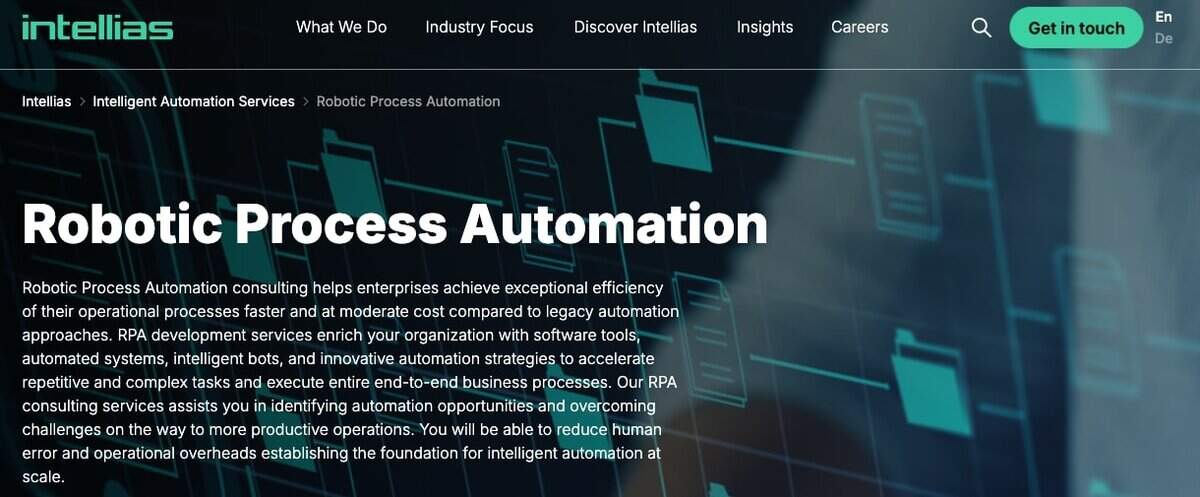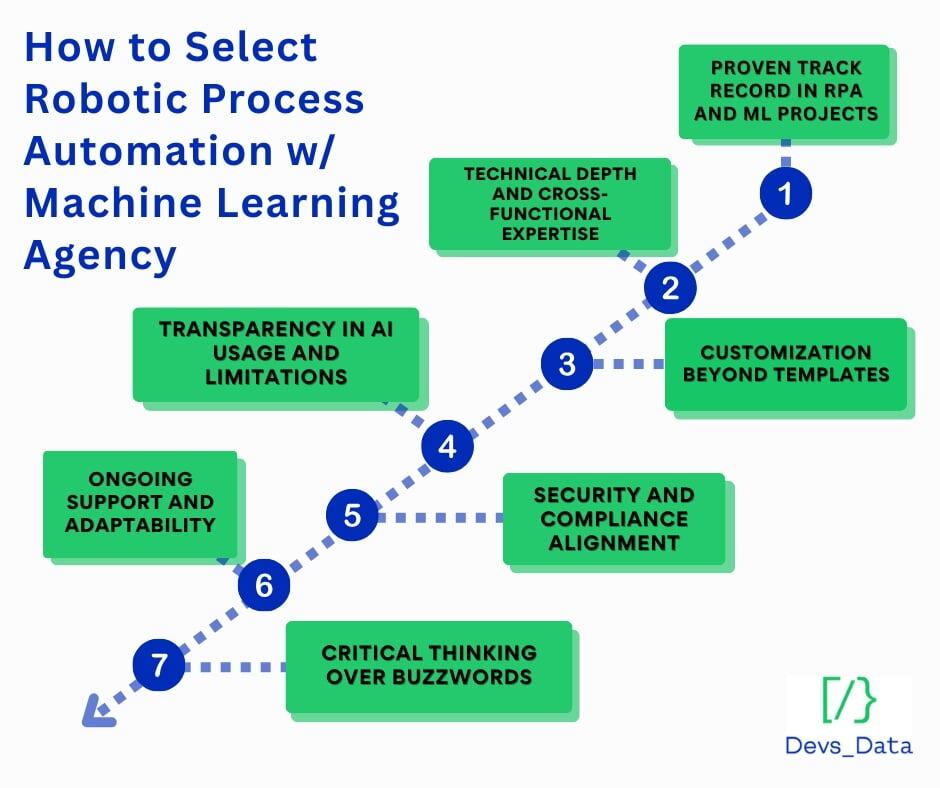


Businesses worldwide are rapidly adopting intelligent automation to stay competitive in an increasingly digital landscape. Robotic Process Automation (RPA) and Machine Learning (ML) are at the forefront of this shift, transforming operations by simplifying repetitive tasks and enhancing decision-making with advanced intelligence. For example, Schneider Electric implemented RPA to automate the processing of personal protective equipment (PPE) orders across its European manufacturing sites. Previously, this task was manual and time-consuming, taking up to 4 hours. With RPA, the processing time was reduced to just 2 minutes, significantly improving efficiency and allowing employees to focus on more value-added activities.
“According to Grand View Research, the global RPA market size was valued at $3.79 billion in 2024 and is projected to grow at a compound annual growth rate of 43.9% from 2025 to 2030.”
RPA is designed to automate repetitive, rule-based tasks such as data entry, report generation, or form processing, freeing up human resources for more strategic and creative work. In contrast, ML focuses on empowering systems to analyze vast datasets, recognize patterns, and make accurate predictions or recommendations. The rapid growth in data availability, advances in computing power, and rising demand for operational efficiency are key drivers behind this market expansion. With the machine learning market projected to reach US$105.45bn in 2025, its role in optimizing workflows and minimizing errors continues to grow.
“Integrating RPA with ML allows businesses to build smarter automation systems that not only execute tasks but also learn and improve with time.”
For example, ML models can process unstructured data, such as scanned documents or emails, and pass relevant insights to RPA bots for further handling. This synergy allows automation of complex workflows that involve decision-making, reducing operational costs and improving accuracy. As these technologies continue to evolve, businesses that embrace the combination of RPA and ML will be well-positioned to enhance efficiency, accelerate time-to-market through faster MVP development and iterative testing, and deliver more personalized, responsive customer experiences. Therefore, businesses must find a reliable partner to navigate the complexities of RPA and ML integration.
To assist in this process, we have gathered a list of the top 5 agencies specializing in delivering advanced RPA with ML solutions. By exploring these agencies, the article aims to help companies select the right partner for achieving transformative automation results.
Here are our top picks to consider:
Website: www.devsdata.com
Company size: ~60 employees
Founding year: 2016
Headquarters: Brooklyn, NY, and Warsaw, Poland
DevsData LLC is a leading agency specializing in RPA with ML, AI, and data science solutions. Known for delivering innovative automation strategies, the company focuses on enhancing operational efficiency through advanced technologies. With a global presence across Europe, North America, and Latin America, DevsData LLC is a trusted partner for businesses seeking to improve productivity via automation.
Furthermore, the company has collaborated with many multinational corporations, hedge funds, and high-growth startups from countries such as Israel and the US. This strong track record is reflected in their public testimonials and a 5/5 rating on platforms such as Clutch and GoodFirms.
DevsData LLC’s expertise includes automating enterprise resource management systems, backend development, and integrating ML-driven applications using tools like UiPath, Microsoft Power Automate, and custom Python-based frameworks. They leverage machine learning for predictive analytics, workflow automation, and intelligent data processing to optimize business operations. With a team of specialists from the US and Europe, including Google-level engineers, the team has completed over 100 projects, impacting over 80 clients.
A prominent example of their influence is their recent collaboration with a top pharmaceutical company, where they introduced an AI-powered solution to improve drug safety monitoring. By utilizing advanced Natural Language Processing (NLP) techniques, DevsData LLC helped the client efficiently track social media for adverse drug reactions (ADRs). This partnership optimized the detection process and offered crucial insights for drug development, highlighting how DevsData LLC’s innovative solutions enhance safety and effectiveness in the healthcare industry.
Key features:
Do you have RPA needs?
For more information about DevsData LLC, contact the team directly at general@devsdata.com or explore their website at www.devsdata.com.

Website: https://codysolutions.com/
Company size: ~100 employees
Founding year: 2019
Headquarters: Austin, TX
Cody Solutions is a custom software development firm, specializing in automation and AI-driven solutions. Their expertise extends to building scalable architectures that integrate ML and RPA, enhancing operational efficiency and decision-making. By leveraging AI-powered automation, Cody Solutions helps businesses streamline workflows, reduce manual tasks, and improve overall productivity. Clients benefit from their hands-on development process, which creates customized solutions that meet specific business needs while reducing operational costs.
Key features:

Website: https://www.intellias.com/
Company size: ~2900 employees
Founding year: 2002
Headquarters: Chicago, IL
Intellias provides comprehensive RPA services to enhance business efficiency by automating back-office and front-office operations. Their solutions incorporate AI and ML technologies to process unstructured data, enabling dynamic and flexible decision-making. Their expertise in managing large-scale, complex automation projects makes them especially well-suited for large enterprises. Intellias assists clients in evaluating automation opportunities, creating actionable implementation plans, and scaling automated workflows to achieve greater business resilience and cost management. Their AI-driven automation tools help organizations reduce human error, boost productivity, and streamline workflows. With a strong presence in industries like finance, healthcare, and logistics, they tailor their services to meet sector-specific challenges.
Key features:
Do you have RPA needs?
To wrap up our overview, let’s take a look at the following 2 companies that stand out for their expertise in RPA with ML.

Website: http://www.itransition.com
Company size: ~1500 employees
Founding year: 1998
Headquarters: Lisbon, Portugal
Itransition is a full-service RPA provider offering end-to-end automation solutions that help businesses streamline repetitive and time-consuming tasks. Their ML services encompass consulting, development, and integration, aiming to help businesses personalize customer interactions, improve product quality, and mitigate risks. With over 25 years of experience in IT consulting and software development, Itransition leverages its expertise to deliver custom ML models and AI-enabled solutions across various industries. Their automation solutions are designed to optimize business processes while ensuring compliance with industry regulations. Additionally, they utilize advanced data analytics to help enterprises gain deeper insights and enhance decision-making.
Key features:

Website: https://andersenlab.com/
Company size: ~3000 employees
Founding year: 2007
Headquarters: Warsaw, Poland
Andersen is a software development company offering various services, including RPA and ML solutions. They focus on automating business processes to enhance operational efficiency and reduce costs. By integrating ML algorithms, Andersen’s solutions enable businesses to process large datasets, identify patterns, and make data-driven decisions. With a global presence and a team of skilled developers, Andersen provides end-to-end automation services, from strategy consulting to solution deployment.
Key features:
Do you have RPA needs?
RPA is especially common in the banking sector, where a large volume of manual, rules-based processes, such as transaction handling, compliance checks, and reporting, can be automated to improve efficiency significantly. Human workers are often augmented by automation software, allowing them to focus on higher-value tasks while software handles repetitive operations with greater precision. In large organizations, RPA has become a core strategy to streamline operations, reduce costs, and minimize the headcount required for routine activities. To quickly grasp the fundamentals of RPA, consider watching this short explainer video below.
One modern RPA platform that has gained popularity and has been successfully implemented in a number of projects is Mendix. This low-code platform allows businesses to develop tailored automation systems efficiently. It supports both structured process automation and AI-enhanced capabilities where needed. Other widely adopted RPA platforms include UiPath, Automation Anywhere, Blue Prism, and Appian.
Understanding the complexities of AI integration in RPA
While RPA systems are typically built on clearly defined rule sets and have been extensively validated by domain experts, the integration of AI introduces additional complexity and risk.
“Unlike traditional automation tools, AI models may produce unpredictable outcomes and are prone to errors, particularly when deployed too early or without adequate testing.”
Since traditional RPA is based on well-tested decision trees, integrating AI, especially probabilistic and less transparent models, should be approached with caution. Premature adoption can lead to operational setbacks rather than efficiency gains.
Moreover, AI-enabled automation systems may pose security risks if not properly vetted. Any tool integrated into the company infrastructure should undergo a thorough internal review by the IT department to confirm that it is safe for internal use and will not compromise sensitive company information. These tools should not be blindly trusted; ongoing monitoring and control must remain in human hands. Experts suggest resisting the urge to optimize prematurely and caution against placing blind trust in AI systems. A stepwise, test-driven deployment allows time to safely uncover edge cases and refine logic.
“When developing large-scale AI-driven automation systems, it is generally recommended to involve in-house, highly skilled IT and AI specialists rather than relying solely on external consulting firms.”
For instance, global consultancies like McKinsey can provide impressive strategic documentation, but their technical implementations often lack depth in complex scenarios. Many such solutions are optimized for ideal conditions and may not withstand real-world constraints. Developing a robust, production-grade AI automation system is a time-intensive effort that benefits from deep internal ownership.
For small and mid-sized businesses looking to streamline operations with affordable automation, the following tools offer accessible entry points. Just be sure to pay close attention to security and how sensitive company data is handled.
| Tool | Description | Recommended use case |
|---|---|---|
| Make.com | Visual workflow builder for connecting apps and automating tasks | Automating repetitive workflows across cloud tools |
| OpenAI / Gemini / Claude API | AI platform integrations for chat, content, or communication tasks (use caution with sensitive data) | Streamlining customer support, document generation |
| n8n | Privacy-focused, open-source alternative to Zapier | Automation with more control over data and logic |
| Airtable Automations | Lightweight automation within Airtable using structured data | Managing internal projects, CRM, and simple reporting |
| ServiceNow | Enterprise-grade automation with optional AI integration | IT service management, HR, and operations at a larger scale |
| Microsoft PowerApps | Low-code tool for building internal apps by non-developers | Creating internal dashboards, forms, or approval systems |
RPA combined with ML and AI represents a powerful evolution in business process management. When implemented thoughtfully, RPA can significantly reduce operational costs, improve accuracy, and free employees to focus on strategic, creative, or customer-facing work. However, successful adoption requires a careful balance of technology, expertise, and governance.
“Organizations should take a measured approach, starting with well-defined, rule-based automation before gradually integrating AI components, while continuously monitoring performance and security.”
Automation delivers long-term value without unexpected risks, and RPA plays a vital role for businesses that want to stay competitive in today’s competitive market.

Choosing the right agency to implement RPA with machine learning is essential for long-term success and operational efficiency. Here are 7 crucial points to consider when evaluating potential partners:
1. Proven track record in RPA and ML projects
Select an agency with demonstrated success in delivering both rule-based automation and machine learning solutions. Look for documented case studies and references in sectors similar to yours. Their past performance is often the best indicator of how well they will handle complex, real-world scenarios in your organization.
2. Technical depth and cross-functional expertise
A reliable partner should offer strong capabilities across software engineering, data science, workflow design, and system integration, not just management consulting. This ensures that they can handle the full scope of implementation, from strategy to execution and post-launch troubleshooting.
3. Customization beyond templates
While many RPA platforms offer prebuilt components, an effective agency should be able to build tailored solutions that match your specific needs, including corner cases and legacy system integration. Standardized setups often break down in edge cases, so custom logic and technical flexibility are essential for long-term stability.
4. Transparency in AI usage and limitations
The agency should clearly explain what aspects of the automation are rule-based versus machine learning–driven. They should highlight expected limitations and failure scenarios, not hide them. This transparency helps your internal team make informed decisions and avoid overreliance on black-box solutions.
5. Security and compliance alignment
Automation often involves sensitive data. The agency must follow rigorous security protocols, align with regulatory standards (such as GDPR or HIPAA), and collaborate closely with your internal IT and compliance teams. Failure to meet compliance and security standards can expose your business to significant legal and financial risks.
6. Ongoing support and adaptability
Post-deployment maintenance is key. Choose a partner who provides continuous monitoring, updates, and improvements as your operations and data evolve. Look for clear Service Level Agreements (SLAs) that define uptime guarantees, support response times, and issue resolution expectations. A reliable agency should also offer a long-term roadmap to keep your automation systems aligned with evolving technologies and business goals.
7. Critical thinking over buzzwords
Avoid agencies that promise overly simplistic AI-driven solutions. A credible team will caution against premature optimization and emphasize a measured, test-focused rollout that addresses complexity and long-term sustainability. They should act as advisors, not just vendors, questioning assumptions and helping you balance innovation with operational stability.
Integrating RPA and ML combines rule-based automation with intelligent data processing, allowing businesses to automate repetitive tasks and complex decisions. This synergy improves workflow efficiency and helps organizations adapt quickly to changing conditions. To effectively implement these technologies, companies should consult specialized agencies that can assess their needs and develop tailored integration plans.
DevsData LLC, our top choice, is a leading agency specializing in advanced RPA and ML solutions, bringing over 8 years of expertise in delivering innovative automation services across a wide range of industries.
With a team of specialists from the US and Europe, along with top-tier developers, DevsData LLC offers tailored RPA and ML solutions to address each business’s unique challenges. Their expertise in these technologies enables them to create efficient, scalable automation solutions that meet client needs.
The agency excels in deploying RPA solutions that optimize workflows, reduce human error, and free up valuable resources. Their team brings over a decade of specialized experience in RPA and ML, handling everything from complex automation projects to ongoing system maintenance. DevsData LLC offers flexible service plans to accommodate various project requirements and budgets, guaranteeing the best possible outcomes for their clients.
In addition to RPA and ML solutions, DevsData LLC provides IT recruitment services, employer of record (EoR) solutions, and business process outsourcing (BPO). These services are designed to help businesses easily integrate RPA and ML technologies while accessing top-tier talent. Their BPO services, in particular, allow clients to optimize operations, reduce costs, and increase productivity.
By combining cutting-edge automation technology with expert workforce management, DevsData LLC is well-positioned to help businesses thrive in the age of digital transformation.
To learn how DevsData LLC can assist your business with RPA and ML solutions, contact them at general@devsdata.com or visit their website to schedule a call and discuss your specific needs.
Frequently asked questions (FAQ)
DevsData – your premium technology partner
DevsData is a boutique tech recruitment and software agency. Develop your software project with veteran engineers or scale up an in-house tech team of developers with relevant industry experience.
Free consultation with a software expert
🎧 Schedule a meeting
FEATURED IN


DevsData LLC is truly exceptional – their backend developers are some of the best I’ve ever worked with.”
Nicholas Johnson
Mentor at YC, serial entrepreneur


 Build your project with our veteran developers
Build your project with our veteran developers
 Explore the benefits of technology recruitment and tailor-made software
Explore the benefits of technology recruitment and tailor-made software
 Learn how to source skilled and experienced software developers
Learn how to source skilled and experienced software developers




Categories: Big data, data analytics | Software and technology | IT recruitment blog | IT in Poland | Content hub (blog)
